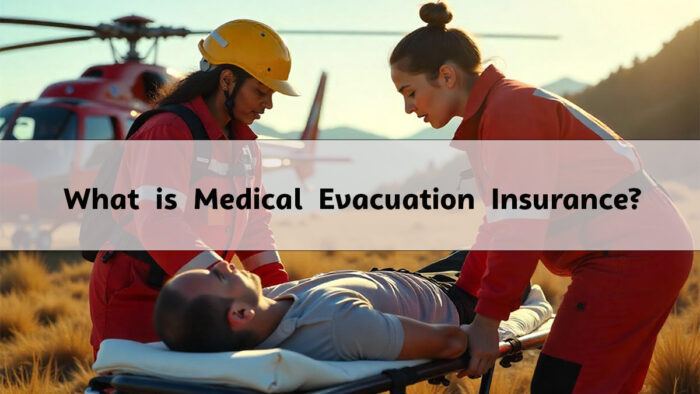Emergency medical evacuation insurance, often called “medevac” insurance, is a type of travel insurance that pays for transportation to a proper medical facility if you’re hurt or fall ill. It may cover your trip back home if your doctor says it’s necessary.

Medical evacuation coverage is typically included in most comprehensive travel insurance plans. It acts as temporary extra health insurance when you’re traveling outside your home country.
Most plans with this coverage will arrange for you (or someone you’re traveling with) to be taken to the closest hospital that can handle your treatment if you get seriously injured or sick. If your doctor decides it’s best for you to go back to your home country for further care, medical evacuation insurance can also cover those travel costs.
What Does Medical Evacuation Insurance Cover?
Medical evacuation insurance can help cover costs when you’re far from home and need urgent medical transport. It can pay for things like emergency transportation, a medical escort, and even flying family members to you. Here’s a breakdown of what it typically covers:
• Emergency transportation
If you get seriously ill or injured while traveling, this insurance can cover the cost to get you to the nearest hospital that can handle your treatment. If needed, it can also pay for your return to the U.S. for continued care.
• Medical escort for your trip home
If your condition requires special care during your trip back, such as needing oxygen or medication, medical evacuation insurance can cover the cost of a trained professional to escort you.
• Flying a friend or family member to your side
If you end up in the hospital during your trip, the insurance can pay for a round-trip ticket for a family member or friend to come be with you. This is usually available if your hospital stay meets a minimum duration, like seven days.
• Costs for a bedside companion
Sometimes, the insurance also helps with the costs for your companion’s stay, such as hotel expenses and meals, while they support you.
• Sending your children home
If you’re traveling with your kids and are hospitalized, your insurance can help arrange and pay for their return home or to another safe location in the U.S. It may cover the cost of their tickets, minus any refunds for flights you didn’t use.
• Repatriation of remains
If you or someone you’re traveling with passes away during the trip, this benefit can cover the cost of returning the remains back home.
What Isn’t Covered by Medical Evacuation Insurance?
There are some common things that medical evacuation insurance often doesn’t cover. They include:
- High-risk activities: If you get hurt during activities like skydiving or scuba diving, your insurance might not cover the evacuation. You may need special insurance for risky activities, though some insurers offer add-ons for adventure sports.
- Drug and alcohol misuse: If an incident happens because of drug or alcohol misuse, it might not be covered unless the substances were prescribed by a doctor.
- Mental illness: Medical evacuation for issues related to mental health, including self-harm or suicide attempts, is often excluded from coverage.
- Medical tourism: If you’re traveling for medical procedures (like surgery) and something goes wrong, your insurance might not cover any evacuation needs that follow.
- Preexisting conditions: Some policies won’t cover issues related to preexisting conditions, especially those found in your medical history. However, some insurers offer waivers to cover these situations.
Also, while medical evacuation insurance can help with transport costs, it usually doesn’t cover the treatment you receive at the hospital you’re sent to. For this purpose, you’d need to have travel medical insurance.
When Do You Need Medical Evacuation Insurance?
This type of coverage is needed and especially important for international trips since most U.S. health insurance plans won’t cover you abroad. If you get hurt or need to be flown back home for medical care, this insurance becomes essential.
It’s also a smart idea for travelers who are planning to do extreme sports like skiing in remote locations, have pre-existing health conditions, or are visiting places that are hard to reach. In these cases, you might need higher coverage limits to make sure you’re fully protected.
Do I Need to Have Both Medical Evacuation and Travel Medical Insurance?
Yes, it’s a good idea to have both medical evacuation insurance and travel medical insurance when traveling abroad. If you’re not ready to pay all your medical bills yourself, it’s important to get travel insurance that covers both emergency medical care and transportation.
Since most U.S. health plans provide little to no coverage outside the country, having travel medical insurance is essential for international trips. Check with your health insurance provider to see if they offer global coverage and whether it’s considered “out of network. Also, seniors should note that Medicare doesn’t work outside the U.S.
How Can I Get Approval to Use Medical Evacuation Insurance?
If you face a medical emergency while traveling, your first step should be to contact local emergency services. After that, you, a companion, or your tour guide should call your travel insurance company’s emergency hotline.
The insurance company’s assistance team, which includes medical professionals and travel experts, will review your situation. They’ll speak with your doctor to manage your care and decide if emergency medical transport is needed. To use medical evacuation insurance, the attending physician at the scene must confirm that your condition requires an emergency evacuation.
In most cases, your travel insurance provider will handle the planning and approval of the evacuation. If this can’t happen immediately, you should notify the insurance company as soon as you can. If emergency medical transport is required, options could include an air ambulance or a regular commercial flight.
How Much Does Medical Evacuation Insurance Cost?
The cost of medical evacuation insurance depends on several factors. These include the insurance company, how much coverage you need, and how long you’re traveling.
For example, quotes from Squaremouth show that a 30-year-old traveling from New York to the UK for seven days, with a trip costing $3,000, could see premiums from $53 to $80 for coverage ranging from $100,000 to $1 million per person. If you extend the trip to 14 days and increase the trip cost to $5,000, the premiums go up to between $88 and $148. These quotes are for comprehensive travel insurance, which includes more than just evacuation coverage.
Overall, medical evacuation insurance is relatively inexpensive compared to the high costs of an out-of-pocket medical evacuation, which can run into tens or even hundreds of thousands of dollars.
How Much Medical Evacuation Travel Insurance Do I Need?
The amount of medical evacuation coverage you need can vary depending on the insurance plan. Some of the best plans offer up to $1 million in coverage per person. For example, AXA Assistance USA’s Platinum plan and Allianz’s OneTripPremier Plan both provide up to $1 million for medical evacuation.
Most travel insurance plans include a 14 or 15-day “free look” period. This allows you to review the policy. If it doesn’t fit your needs, you can switch to a different plan. Alternatively, you can cancel for a full refund during this time.
Do You Need Evacuation Insurance for Trips within the U.S.?
Even when traveling within the U.S., medical evacuation insurance can be a good idea in certain situations. For example, if you’re heading to a remote area for an adventure trip, like a dude ranch, having evacuation coverage is smart. While your health insurance should cover your hospital transport and care, it may not cover the cost of a flight home with medical equipment and an escort. Plus, you’d still need to handle any copays and deductibles.
If you’re visiting a friend in a city like Chicago, you plan to do some sightseeing. You probably don’t need evacuation insurance for that trip.
How to Buy Medical Evacuation Insurance
Choosing the right medical evacuation insurance depends on your needs, preferences, and health. It also relies on the details of your trip, such as where you’re going and how long you’ll be away.
You can buy medical evacuation insurance on its own. You can buy it as part of a comprehensive travel insurance plan or along with a travel medical insurance plan. Comprehensive travel insurance often includes additional benefits like trip cancellation, trip interruption, trip delay, and baggage coverage.
Once you know how much coverage you need, you can get quotes online. Compare quotes through sites like Squaremouth or directly from insurance providers’ websites. Read the policy carefully to understand any requirements or limits on your benefits before you buy.



